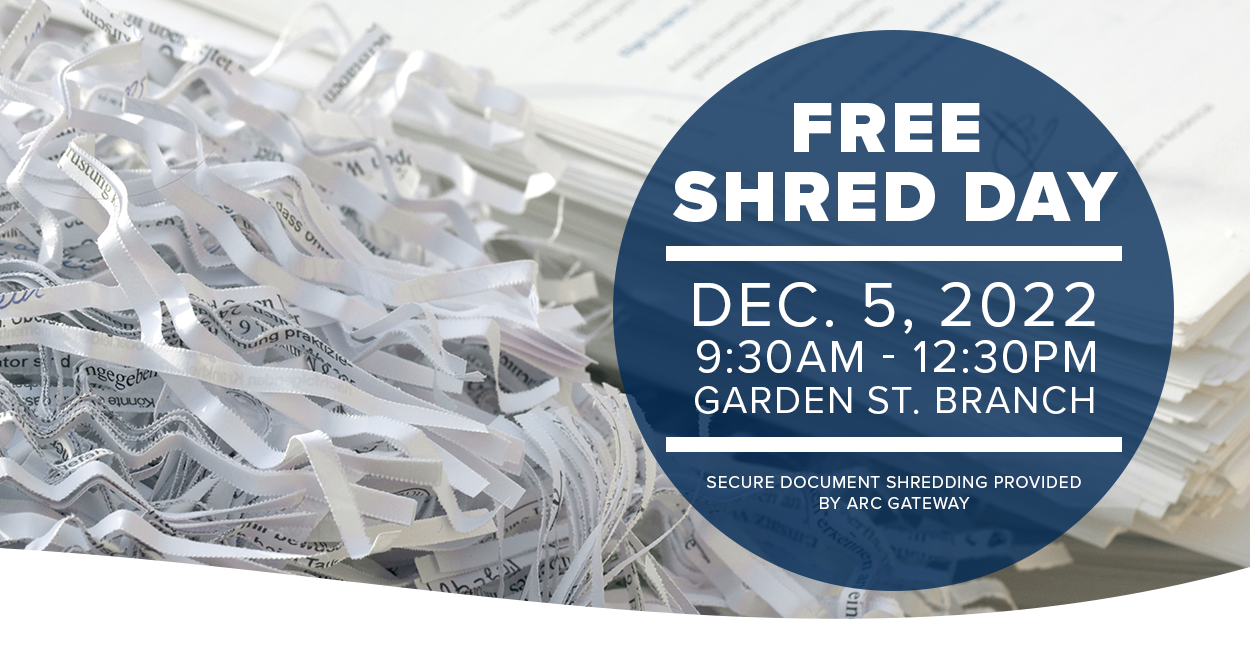
With a growing number of Americans being impacted by identity theft each year, it's important to take steps to help you protect your personal information. How often do you consciously think about what documents you throw in the recycle bin or trash? You could be over-looking a crucial step in disposing of your documents, leaving you vulnerable to criminals. To help keep your identity secure, it's important to shred documents containing personal or financial information. As part of the ongoing effort to help our members protect their personal and financial information, we're sharing what documents you should always keep in a secure location and documents you should always shred with a cross-cut shredder and dispose of securely.
Document/Item |
How Long to Keep |
|
Monthly Utility Bills |
Keep monthly utility bills until they are paid (unless you're deducting part of your home off your state and federal business taxes). |
|
ATM receipts |
Keep ATM receipts until you've balanced your account(s) or checkbook. |
|
Medical Bills |
Keep your medical bills until they're paid (unless you deduct medical expenses from your taxes). |
|
Canceled or Voided Checks |
Canceled or voided checks contain account numbers that can lead to fraud or identity theft. Unless you need to keep it for tax purposes, once a check is canceled or voided, shred the hard copy to keep your account information safe. |
|
Credit Union/Financial Statements |
Keep your credit union/financial statements until you've balanced your account(s) or checkbook (unless you need them for tax purposes). |
|
Pay Stubs |
Keep pay stubs until you've balanced your W2 at the end of the year. If you're considering a loan for a major purchase, like a house, keep your pay stubs until the loan is closed. |
|
Monthly/Quarterly Account Statements |
Keep your monthly/quarterly account statements until the annual statement arrives. |
|
Credit Card Statements |
Credit card statements should be kept for one year, unless you need them for tax purposes. |
|
Credit Card Receipts |
Credit card receipts should be kept for one year, unless you need them for tax purposes. |
|
Expired Debit or Credit Cards |
Expired debit or credit cards should be destroyed immediately. |
|
Balance Transfer/Cash Advance Checks |
Sometimes you may receive balance transfer or cash advance checks for your credit card(s) in the mail. Shred these checks immediately unless you plan on taking advantage of the offer. |
|
Tax Returns and Supporting Documents |
Tax returns and supporting documents should be kept in a secure location for seven years. You can be audited for no reason for up to three years after you file your return. If you omit 25% of your gross income, that period extends to six years. |
|
Records of Selling a House |
Records of sale should be kept for seven years (Documentation for Capital Gains Tax). |
|
Records of Buying a House |
These records should be kept until you have sold the home. However, any documents related to taxes should be held for seven years. |
|
Records of Home Improvements |
These records should be kept seven years after filing the tax return that includes the income or loss on the home when it's sold. |
|
Old Car Registrations |
While a car registration by itself my not lead to identity theft, the information on the paperwork can be used as part of a scheme to steal your identity. All expired or outdated government paperwork and IDs should be shredded for your security. |
|
Product Warranties |
Keep product warranties until you no longer own or use the product, or until the warranty expires, whichever comes first. |
|
Retirement Plan Statements |
Keep the annual statements for your retirement plan as long as you have assets in the plan. |
|
Year-end Account Statements |
These statements should be kept until you no longer own the investment. |
|
Loan Paperwork |
Keep loan paperwork until the loan is paid. If you receive a payoff statement when the loan is paid, keep that indefinitely. |
|
Insurance Policies |
Your insurance policy paperwork should be kept as long as you own the policy. |
When disposing of old documents, be on the lookout for content that reveals your identity or financial details. If you see your social security number (SSN), bank account or other sensitive information, shred the documents and dispose of them in a secure way. As a general rule, you should shred anything that has expired immediately (ex: credit card, debit card, identification cards, etc.). It's always better to be over cautious when discarding documents. If there is any chance the paper contains personal information, the best choice is to shred it.
Additionally, documents like your marriage license, birth certificate, wills, adoption papers, death certificates, and records of paid mortgages should always be kept in a secure location, like a safe deposit box, and never destroyed.
Come Shred With Us
As a member of Members First Credit Union of Florida, your personal and financial safety is important to us. That's why we're offering our members the perfect opportunity to clear out the clutter and clean house in a safe and secure way.
![]()
We're partnered with ARC Gateway to provide our members with secure document shredding and disposal services at our branch on Garden St. on Monday, December 5, 2022, starting at 9:30 a.m. to 12:30 p.m.
RESOURCES
« Return to "Blog"







